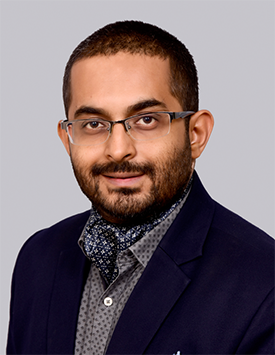Interview with Vibhor Kumar Singh, author of the book "The Billionaire and the Monk: A Simple Story about Finding Extraordinary Happiness"
on Jan 24, 2022

I grew up in the hill town of Nainital in the Indian Himalayas. Where air was pure and rains where heavy. The slow pace of life in the small town gave me enough time to observe life, people and enjoy nature's bounties to the fullest.
I was schooled at Sherwood College and did my B.Com (H) from the Shri Ram College of Commerce followed up with a Masters in Accounting and Finance from the London School of Economics and Political Science.
I love the simple things of life like chai, history and Bollywood films. I work at the Stock Markets. My first book is "The Billionaire and the Monk' which is a simple story about finding extraordinary happiness. It is an attempt to help people uncomplicate their lives and enjoy the gift of happiness.
1) The book title says - Finding Extraordinary Happiness. What do you specifically, mean by extraordinary happiness?
I have always believed that the most fundamental knowledge holds the most incredible wisdom.
Similarly, the secret of happiness lies in how we deal with the most simple acts of our daily life. It is the mundane acts, not the grandiose celebrations, that hold the key to our happiness. And this is what I think makes happiness extraordinary. Even though we are willing to undertake tremendous tasks to find happiness, it will always be the simple things that will give us the most joy. Happiness always lies in the uncomplicated.
The truth is, it is always apparent to everyone where to find their happiness, but seldom do people have the courage to go there. It may be an oxymoron, but happiness is simple to find, which makes it extraordinary.
2) 'Catching Happiness with Vibhor' - Podcast and 'The Billionaire and the Monk' Book - Both delineate the meaning of happiness. Have you always wanted to help people so that they bring the best out of their lives?
I think being happy is a fundamental right. After all, all human activity is guided towards attaining happiness. If you look around, you will realise that the end goal of all human actions is to find happiness.
I want people to realise that happiness is simple to attain through my works. However, it is equally important to understand that celebratory enjoyment and instant gratification should not be confused with happiness. Happiness is a much simpler concept. I personally believe that a person can be happy even in the most challenging times. It may seem like a contradictory statement, but if you look back on all the difficult times of your life, you will realise that most of them are insignificant now. It is human nature to exaggerate sorrow and undermine happiness. I want to change this. Hence, I want to reach out to as many people as possible and make them realise that happiness is all around them. They just need to accept this.
3) How can someone attain happiness through the simplest acts in daily life?
The one-act that is the key to happiness in our daily lives is 'Gratitude'. The moment you embrace gratitude, you attain happiness. The remorse for what happened yesterday and the disappointment that may occur tomorrow are the two villains that don't let you be happy.
Gratitude enables us to unconditional our happiness from yesterday and tomorrow. This very act is liberating and essential for attaining happiness. Gratitude gives you the freedom from past failures and equips you to fight future fears. Nothing is more important to find happiness.
I strongly recommend that people practice gratitude at all levels. This will enable people to find happiness even in the simplest acts in their daily lives.
Sustainability of happiness is always more important than temporary shots at happiness.
4) Why did you decide to write on the subject 'Self-Help'?
During one of my travels to Bhutan, a person told me something about happiness that was so simple yet effective that it has stuck with me for all these years. He said that the human tongue defines our joy in life. Ever since, I have been careful about what my tongue does. If you can control your tongue by being wise on what words it produces and being careful but what it encourages the body to consume, you would have more or less covered 80% of the factors that bring happiness.
Through my creative endeavours, I have tried to use my tongue to spread simple knowledge that I believe everyone knows, but very few follow. So this book is actually an internal assessment of how much I have actually 'self-helped' myself.
I wrote this book to add value to the lives of the reader. It was a way to share and give back what I had learned. It was a way to thank life for all it had taught me.
Hopefully, I will stimulate the readers to acknowledge that happiness is not a complicated desire. Happiness is simple. Happiness is attainable.
5) Why does happiness consider an elusive concept? Share your thoughts on this.
It is human nature to complicate things. Even if we have all the happiness in the world, most people are not willing to accept this fact. It gives us a sense of achievement to 'work' towards solving our problems, even though most of these problems are self-made. Suppose you zoom out and look at your life's big picture. In that case, you will realise that overthinking and jumping to conclusions is the real reason for the unhappiness in your life.
I have realised that the world has a tremendous ability to create noise and distractions. Most people get so lost in this noise and fog that they spend their entire lives searching for a path and forget to reach any destination! I have always found it disappointing to see how easily people give up the happiness in their lives because the world wants them to. Fancy words like 'Achievements', 'success', 'ambition', 'productivity', 'goals' are thrown at us all the time to make us feel guilty about our ordinary and simple happiness.
The world tells us not to be happy today because more enormous happiness lies ahead. There is nothing wrong with being ambitious or trying to achieve your dreams. Be ambitious, take risks, work hard. However, is sacrificing your happiness today a necessary tradeoff for achieving your goals?
We love the romance of sacrificing happiness today for a 'happy ending'. It is different that there is no guarantee of happiness in the future. Still, we trudge along in life, not valuing what we have today.
This misunderstanding that happiness today means that you are not ambitious has been planted in our minds. The truth is that if you are constantly sacrificing your happiness today for a future' achievement', you have chosen an incorrect goal. If you are not happy on your journey to your destination, you are probably chasing a borrowed dream.
6) How happening was it to switch roles from a stock market professional to a writer in daily life?
The truth is there is no more extensive teacher of the art of 'un-conditioning' your happiness than the market. The markets have their own way to teach you about life and also how it is essential to develop a sense of detachmentment. Working in the markets gives you the courage to understand that happiness cannot be defined by wins and losses.
I still work in the markets, and I am learning a lot about happiness analysing and studying the financial world's various components. It is a continuous and dynamic learning curve. I firmly believe that happiness and economics are the 2 main drivers for any person's life. Money can buy happiness, provided you know what you are looking for. However, it is not the quantity of money that matters. Instead, the quality of life that one can get from money defines one's happiness. This is an important aspect that everyone needs to understand.
7) How does the level of happiness change from person to person?
At the core, happiness is the same for everyone.
We like to believe that happiness is different for different people because we define happiness as achieving goals. Most people quantify happiness by using the phrase ‘achieve happiness’. This subtle difference is actually the main reason most people never find happiness. I would prefer that people try and ‘attain happiness’ instead. The moment you link your happiness to achieving a plan, you are surrendering the right to be happy. What happens when you reach the goal? You will find another attractive goal on the horizon. You will then make your happiness conditional to achieving that new goal. This cycle of goal chasing consumes most of our lives. Only later in life, we realise that we have so much to be happy about throughout our journey. However, we willingly threw it away because we wanted our happiness to be more enormous than our neighbours.
So, happiness is the same for everyone. Let us not put measurements to it. Attain rather than achieve happiness.

.jpg)
.jpg)
.jpg)
.jpg)
.jpg)

.jpg)
.jpg)
.jpg)
.jpg)
.jpg)


.jpg)

.jpg)










Sorry! No comment found for this post.